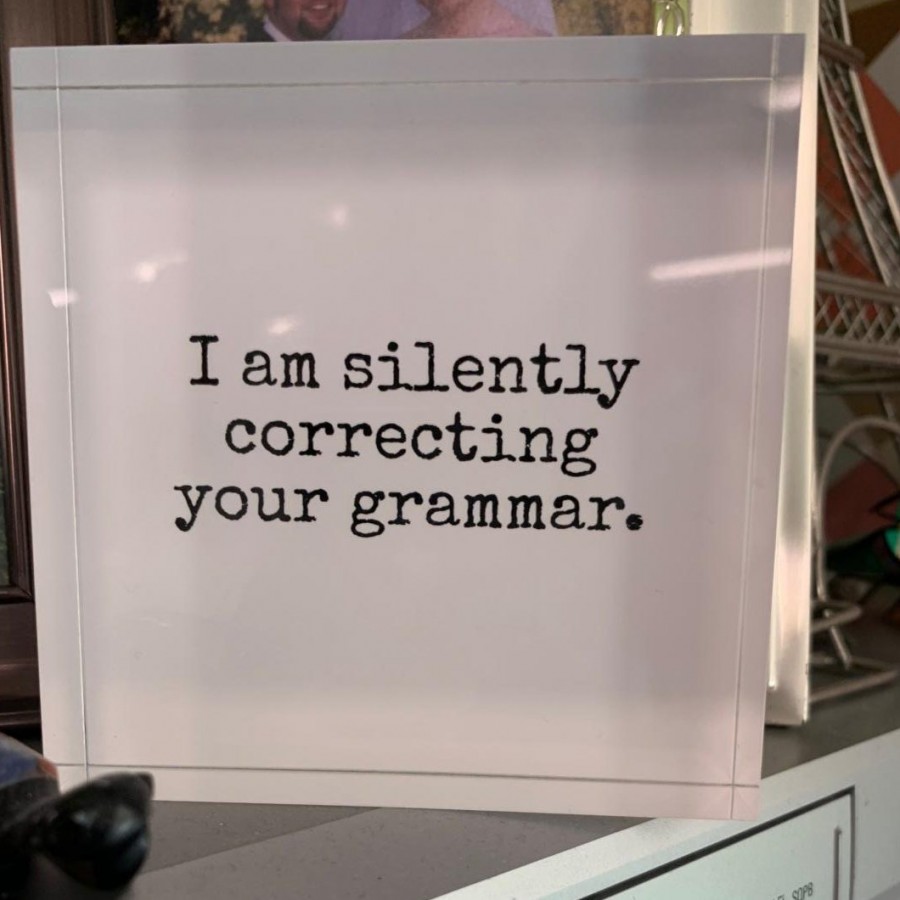There’s always that one person. The one who corrects your spelling of “you’re” in a text message. The one who complains that “ain’t” isn’t a real word. The one who gets a tiny swell of pride whenever they say the words, “Actually, it’s whom.” That person, who learned all the secret rules of English grammar and wants to flex their enormous brain muscles over the fools that dare to leave a dangling preposition. Chances are: they suck.
As it turns out, not only do they suck, their efforts to improve the grammar around them are pointless. The idea that one’s grammar should be perfect stems from older generations, claiming that “the youth” are ruining English as a language. This concept is nothing new. There have been people throughout history complaining about the changes in language because of the youth, dating all the way back to Socrates, who criticized the use of writing because it would “create forgetfulness in the learners’ souls” due to less of a need to memorize ideas. Another example would be the poet Bokenham in 1440, who complained that people were blending Anglo-Saxon English and French to the point of mutilating both languages. The irony of these statements is lost on both scholars: without writing, Socrates’ works would be unknown today. Bokenham used words rooted in French etymology, such as “corruption” and “familiar.” The language evolutions they both complained about shaped the future in numerous positive ways.
That seems to be the damning quality of grammar sticklers: half the time, they make the same mistakes. People that are hell-bent on the quality of grammar tend to be older, and perceive the youth to be less intelligent with language because of the rise of the internet and social media. They criticize teenagers that incorrectly use the words “literally” and “like” but seem to ignore when they themselves use words in hyperbole. Of course they haven’t seen a certain movie “a million times,” just like a teenage girl isn’t “literally dying” because someone made them laugh really hard. It’s a simple use of hyperbole.
The use of slang by the youth is usually seen as an indicator that the quality of the language is declining, but this could not be further from the truth. In fact, when someone uses slang, it shows that they know the actual meaning of the phrase, but are using it as a sort of code. For example, a slang term that has become popular recently is “sus,” which is shorthand for “suspicious.” When someone agrees that a white van parked outside of an elementary school is a little “sus,” they clearly know and understand the meaning of the word “suspicious,” they’re just shortening it for the sake of encoding the phrase. According to ASL teacher at PVHS Evan Terronez, “If you can use slang that’s outside your wheelhouse, it shows that you’re informed.”
If slang makes people dumber, it doesn’t show in academic papers. English teacher Ann Berger acknowledges that, yes, “…some of the language and the way that we text is showing up in [first drafts], but I don’t think it’s really changed the final copy.” No matter how much slang is used in the first draft, the final draft still uses formal language. Student Nolan Yoerger agrees: “They are two different modes in my mind.”
The use of slang terms by younger generations has always been looked down upon by older people who consider themselves more “sophisticated,” but there is no reason to do so. When young people use slang, they clearly know what they’re talking about, they’re simply using a code. All they’re doing is playing with language, and it’s going to change communication for the better.








